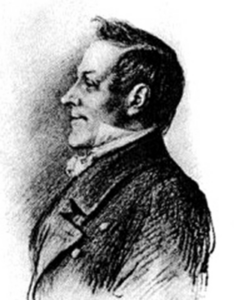Consolation
(Poet's title: Trost)
Set by Schubert:
D 671
[October 1819]
Hörnerklänge rufen klagend
Aus des Forstes grüner Nacht,
In das Land der Liebe tragend
Waltet ihre Zaubermacht.
Selig, wer ein Herz gefunden,
Das sich liebend ihm ergab,
Mir ist jedes Glück entschwunden,
Denn die Teure deckt das Grab.
[Tönen aus des Waldes Gründen
Hörnerklänge an mein Ohr,
Glaub ich wieder sie zu finden,
Zieht es mich zu ihr empor!
Jenseits wird sie mir erscheinen,
Die sich liebend mir ergab,
O welch seliges Vereinen,
Keine Schrecken hat das Grab.]
Horn calls can be heard lamenting
Out of the green night of the forest,
Carrying us into the land of love
As its magical power asserts itself.
Blessed is he who has found a heart
That has given itself to him in love,
For me every happiness has vanished
Since the dear one is covered by the grave.
Notes from the depths of the forest,
Horn calls hitting my ear,
I believe that I shall find her again,
I shall be drawn up towards her!
Over there she will appear to me,
She who gave herself to me in love,
Oh what a blessed re-union,
The grave holds no terrors.
All translations into English that appear on this website, unless otherwise stated, are by Malcolm Wren. You are free to use them on condition that you acknowledge Malcolm Wren as the translator and schubertsong.uk as the source. Unless otherwise stated, the comments and essays that appear after the texts and translations are by Malcolm Wren and are © Copyright.
☙
Themes and images in this text:
Covers and covering Ears Graves and burials Green Hearts Horns Laments, elegies and mourning Night and the moon Resurrection Woods – large woods and forests (Wald)
The only primary source for this poem is Schubert’s manuscript of his setting. He wrote out the first eight lines and then added a repeat mark, but it is almost certain that the second stanza that was included when the song was published by Diabelli in 1849 was not part of Mayrhofer’s original. He did not include this text in the 1824 edition of his works, and this has led to speculation that the editors of Schubert’s Nachlass had to commission a second verse in the 1840’s so that the music could be repeated.
It certainly appears to be the case that the second stanza, with its pious promise of resurrection and reunion, is not in the depressive Mayrhofer’s usual style. It also seems to be different in tone and theme from the (presumably) authentic first verse, which Schubert set when he was extremely close to the poet. Although the horn calls at the beginning are connected with love, they are also elegiac and evocative of loss. Everything in stanza one ends in the grave. The supposed continuation challenges this bleak assessment of this situation and claims that the sounds of the horns are offering promise and resurrection. The grave is not the end since it holds no terrors for those who are due to be reunited ‘over there’ (jenseits).
Of course, it could be that Mayrhofer was trying out an experiment whereby the gloomy thoughts of loss and grief give way to hope and reunion, but if this were the case it is unlikely that Schubert would have decided to set the text strophically. It would have made more sense to produce a through-composed song in which the harmonies modulate in accordance with the changing perceptions and outlook. The balance of probabilities points to the inauthenticity of lines 9 to 16.
☙


